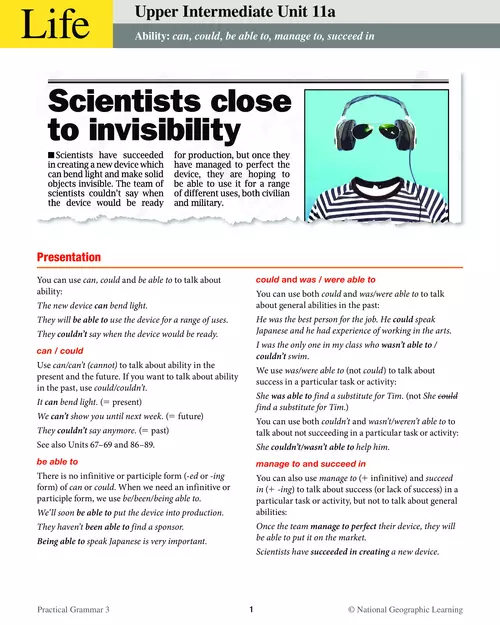
Life Upper Intermediate Unit 11a
National Geographic Learning. Life Pre-intermediate Unit 1b. Present simple and present continuous. Presentation. Present simple. Present continuous.
adsPart of the document
You can use can, could and be able to to talk about
ability:
The new device can bend light.
They will be able to use the device for a range of uses.
They couldn't say when the device would be ready.
can / could
Use can/can't (cannot) to talk about ability in the
presentand the future. If you want to talk about ability
in the past, use could/couldn't.
It can bend light. ( present)
We can't show you until next week. (future)
They couldn't say anymore. (past)
See also Units 67-69 and 86-89.
be able to
There is no infinitive or participle form (-ed or -ing
form) of can or could. When we need an infinitive or
participle form, we use be/been/being able to.
We'll soon be able to put the device into production.
They haven't been able to find a sponsor.
Being able to speak Japanese is very important.
could and was / were able to
You can use both could and was/were able to to talk
about general abilities in the past:
He was the best person for the job. He could speak
Japanese and he had experience of working in the arts.
I was the only one in my class who wasn't able to /
couldn't swim.
We use was/were able to (not could) to talk about
success in a particular task or activity:
She was able to find a substitute for Tim. (not She could
find a substitute for Tim.)
You can use both couldn't and wasn't/weren't able to to
talk about not succeeding in a particular task or activity:
She couldn't/wasn't able to help him.
manage to and succeed in
You can also use manage to ( infinitive) and succeed
in ( -ing) to talk about success (or lack of success) in a
particular task or activity, but not to talk about general
abilities:
Once the team manage to perfect their device, they will
be able to put it on the market.
Scientists have succeeded in creating a new device.


